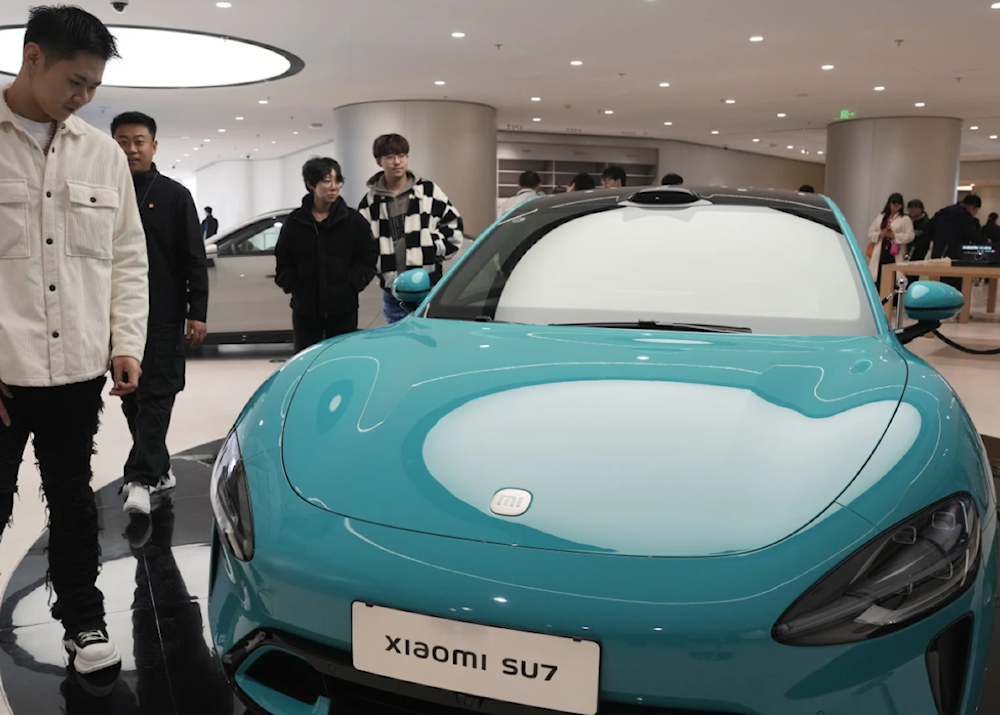Xiaomi takes aim at Tesla in Chinese auto market with new EV
The business struck a production collaboration with state-owned manufacturer BAIC Group and unveiled the SU7 - short for Speed Ultra 7 - sedan in December.
-

Visitors to the Xiaomi Automobile flagship store look at the Xiaomi SU7 electric car on display in Beijing on March 26, 2024. (AP)
Xiaomi, a Chinese smartphone company, presented an efficient electric car on Thursday with stylistic elements inspired by Porsche and priced lower than Tesla's (TSLA.O), Model 3, indicating fierce competition from new players in China's already crowded electric vehicle industry.
Xiaomi CEO and founder Lei Jun announced, that the standard SU7 EV model will cost 215,900 yuan ($29,872.02), while the Pro and Max versions will cost 245,900 and 299,900 yuan, expressing that it was "30,000 (yuan) cheaper than the Model 3."
Tesla's Model 3 costs 245,900 yuan in China. He also claimed that several of the SU7's capabilities, compared to Porsche's Taycan and Panamera models, outperformed those of Tesla and Porsche. For example, Lei stated that its minimum range of 700 km outperformed Tesla Model 3's 567 km.
The launch fulfills the objective of Xiaomi's founder, who announced the company's entry into EVs in 2021 and committed to invest $10 billion in its vehicle industry as "the last major entrepreneurship project" of his life.
The business struck a production collaboration with state-owned manufacturer BAIC Group and unveiled the SU7 (short for Speed Ultra 7) sedan in December.
The firm revealed it got 50,000 orders in the first 27 minutes. Deliveries for the Standard and Max versions will begin in late April, with the Pro models arriving by the end of May.
Lei also stated that the process had not been easy, revealing that in the 3 years it took to develop the vehicle he realized that "making cars is extremely difficult. Even a giant like Apple gave up on it," calling those who still make cars "a hero of our time."
Experts are unsure if Xiaomi's vehicle initiative will succeed. Some argue that it is a natural development for the corporation, whose rice cookers, air purifiers, and other devices are commonplace in Chinese households.
The SU7 represents a change from the company's image as a cost-effective brand. Experts believe Xiaomi's smartphone experience provides them an advantage over traditional automakers when it comes to smart cockpits, a feature that Chinese buyers value.
The SU7 employs the company's self-developed Hyper OS as the operating system that links EV users with its other gadgets.
China has dedicated massive resources to developing technologies relevant to the sector since the early 2000s.
Billions of subsidies and incentives gave Chinese automakers a significant headstart against foreign competitors.
European Commission investigates China's dominating EV sector
China's Minister of Commerce is set to travel to Europe in April for discussions regarding the European Commission's inquiry into whether China's electric vehicle sector has received unfair subsidies, informed sources told Reuters.
Minister Wang Wentao's itinerary reportedly includes a visit to France, as confirmed by a source within the French government and two other informants familiar with the trip.
The European Commission has launched a probe to assess the potential imposition of tariffs on exports, aimed at safeguarding European car manufacturers. The investigation is scheduled to conclude by November, with the possibility of provisional duties being imposed earlier at the discretion of the EU executive.
The European Commission has projected that China's electric vehicles sales in Europe could dominate 15% of the market share by 2025, citing price disparities compared to European-manufactured battery-powered cars.
Beijing has refuted allegations that its electric vehicle industry has flourished due to subsidies and has labeled the EU inquiry as "protectionist."
Analysts argue that various factors, including China's control over the battery supply chain, innovation, and fierce competition within its domestic market have contributed to price reductions.

 4 Min Read
4 Min Read








